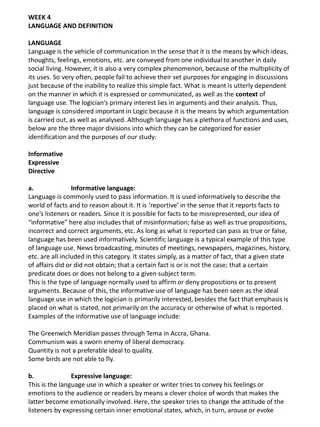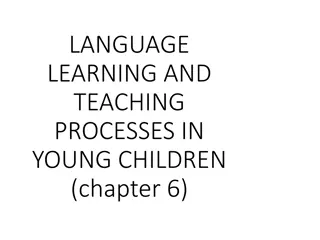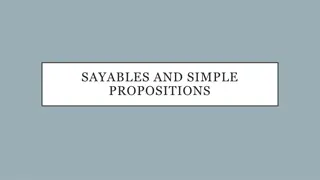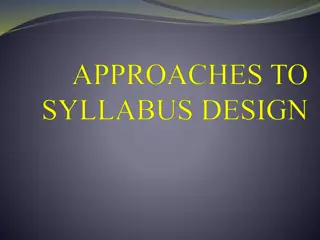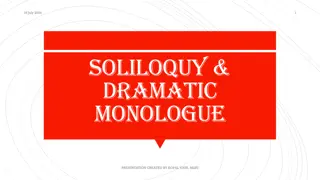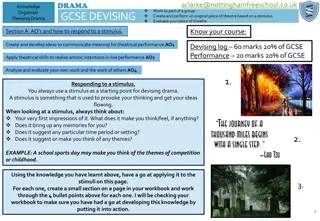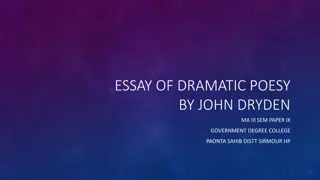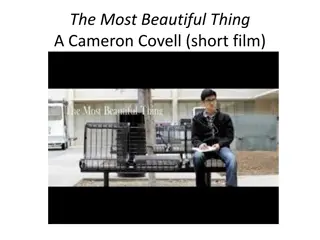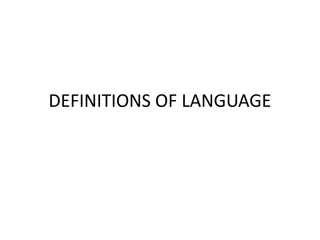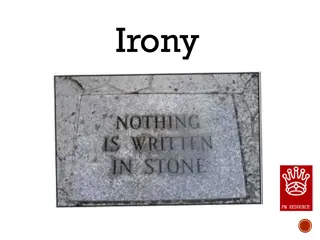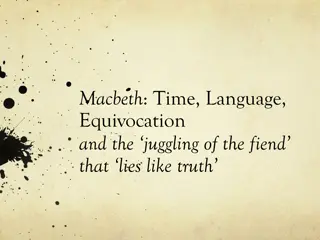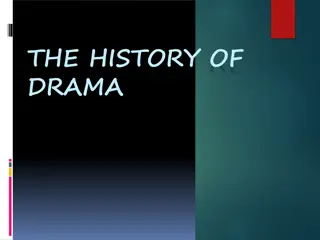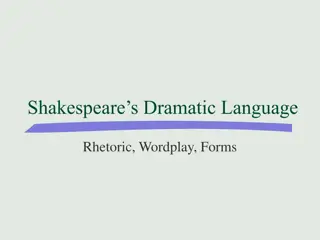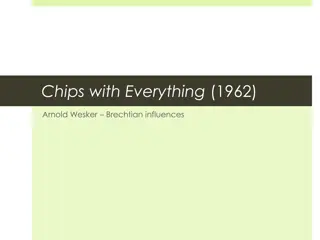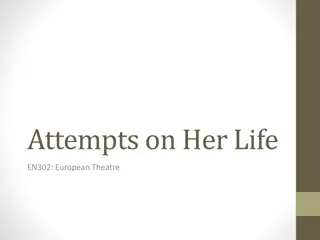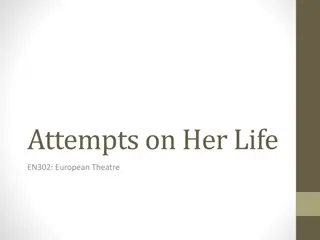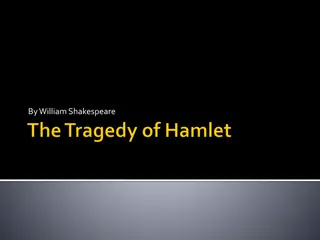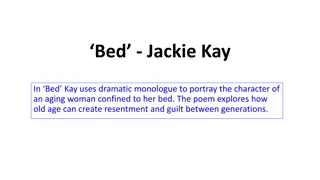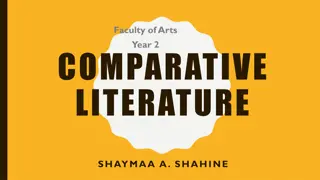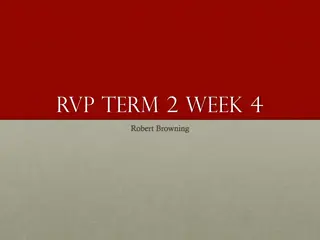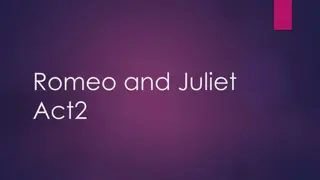Career Opportunities and Challenges in Translation & Interpreting Pedagogy Post-Pandemic
The APTIS 2022 conference explores new avenues in Translation and Interpreting (T&I) pedagogy amidst a changing landscape. Dr. Bego A. Rodriguez highlights emerging roles for T&I graduates. The context reveals a decline in language learning in the UK, impacting the Language Service Industry. The UK'
0 views • 13 slides
Language Study Community – Enhance Your Language Skills
Joining a Language Study Group is a fantastic way to take your language learning to the next level. By leveraging the power of Group Study, you can immerse yourself in the language, enhance your understanding, and build confidence in your speaking abilities. Read full article \/\/explainlearning.com
1 views • 3 slides
Academic Language Demands and Supports in Instructional Planning
Academic Language Demands and Supports are crucial in educational settings to ensure comprehension and usage of language by students. This content discusses embedding language demands in lesson plans, providing language supports, and peer review activities to enhance academic language skills. The fo
6 views • 10 slides
The Significance of Media in Language Learning
Media plays a crucial role in language learning by raising awareness of the ideology behind linguistic structures and providing valuable information on society and culture. Linguists are drawn to media language for research purposes and to understand its impact on language use and attitudes. Media s
12 views • 5 slides
Understanding Translation: Key Concepts and Definitions
Translation involves transferring written text from one language to another, while interpreting deals with oral communication. Etymologically, the term "translation" comes from Latin meaning "to carry over." It is a process of replacing an original text with another in a different language. Translat
11 views • 76 slides
Language and Communication in Society: Understanding Interactions
Explore the intricate relationship between language and society through lectures focusing on language in interaction, power dynamics, language contact and change, public space discourse, linguistic landscaping, and more. Delve into the shift from structural linguistics to societal communication, red
6 views • 28 slides
Understanding Language: Informative, Expressive, and Directive Uses
Language serves as a vital medium for communication, allowing the conveyance of ideas, thoughts, and emotions. It is a complex phenomenon with diverse uses. This text delves into the three major divisions of language use - informative, expressive, and directive. Informative language conveys facts, w
4 views • 6 slides
Language Learning and Teaching Processes in Young Children
Development of language in young children is influenced by various factors such as their cultural and linguistic environment, unique characteristics, and interactions with adults. Optimal language development requires language stimulation from the environment. Varied cultural practices impact langua
1 views • 51 slides
Understanding Language in Stoicism: Significance and Corporeality
Language in Stoicism plays a crucial role in the process of assenting to impressions by focusing on corporeality, reason, and truth. It distinguishes between the mundane vocal sounds, articulated speech, and significant language to convey meanings effectively. The significance of language lies not i
2 views • 13 slides
Understanding Language Teaching Syllabus: Integration, Theory, and Approaches
Language Teaching Syllabus involves the integration of subject matter and linguistic elements, guided by theories of language and learning. Various approaches like Grammatical, Situational, Communicative, and Analytic are used to structure syllabi. Breaking language into parts aids in sequential lea
1 views • 28 slides
Understanding Soliloquy and Dramatic Monologue in Literature
A soliloquy is a form of monologue where a character speaks to themselves, the audience, or a surrogate, revealing inner thoughts. This presentation explores different types of soliloquies and their significance in literary works, including examples from Shakespeare's Hamlet. Additionally, it delves
0 views • 9 slides
Devising Drama - GCSE Knowledge Organiser
This GCSE Drama Knowledge Organiser provides guidance on devising and performing an original piece of theatre based on a stimulus. It covers how to respond to stimuli, develop ideas for theatrical performances, apply theatrical skills, analyze and evaluate work, and rehearse and refine the devised p
0 views • 10 slides
Debate on Dramatic Poesy by John Dryden
John Dryden's work "Essay of Dramatic Poesy" is a dialogue among four speakers that debates the merit of classical versus modern drama, the comparison between French and English drama, and the use of rhyme in plays. Each speaker presents arguments showcasing their perspectives on these topics, revea
0 views • 5 slides
Exploring Language and Communication Through a Short Film
In this lesson, students will watch a 10-minute short film titled "The Most Beautiful Thing" by Cameron Covell. They will reflect on the value of learning another language, analyze how facial expressions and body language convey emotions, and develop empathy towards those facing language barriers or
0 views • 29 slides
Various Definitions of Language Throughout Linguistic History
Different linguists and scholars have offered various definitions of language over time. Sapir (1921) emphasized language as a method of communicating ideas, emotions, and desires through voluntary symbols. Bloch and Trager (1942) focused on the social aspect of language as a system of vocal symbols
1 views • 12 slides
Understanding Irony in Verbal, Dramatic, and Situational Contexts
Explore the nuances of verbal, dramatic, and situational irony through examples and explanations. Verbal irony involves saying something different from what is meant, often using humor like puns. Dramatic irony occurs when the audience knows something the characters don't, creating suspense. Situati
0 views • 12 slides
Enhancing Language Learning Across the Curriculum in B.Ed. 1st Year Course
Language Across the Curriculum (LAC) emphasizes that language learning should occur across all subjects, not just in language classrooms. It highlights the importance of incorporating language development into every learning activity, fostering multilingualism in schools. Language plays a crucial ro
2 views • 34 slides
The Art of Dramatic Writing: Exploring Character Development and Dialectical Approach
Every object and human has multiple dimensions that influence character development in dramatic writing. Understanding the physiological, sociological, and psychological aspects, along with the impact of the environment and dialectical approach, shapes characters' growth and decisions in storytellin
0 views • 12 slides
Analysis of Time, Language, and Equivocation in Macbeth
The play Macbeth explores intricate themes of time, language, and equivocation through vivid characters and dramatic dialogue. The protagonist, Macbeth, grapples with moral dilemmas, as seen in key scenes like Lady Macbeth's infamous hand-washing. The witches' cryptic statement, "Fair is foul, and f
0 views • 12 slides
Exploration of Various Poetry Forms: Descriptive, Narrative, Dramatic, and Metaphysical
Poetry is a diverse art form encompassing descriptive portrayal, storytelling narratives, engaging dialogues, and profound metaphysical insights. Descriptive poetry vividly captures objects and scenes like paintings, narrative poetry weaves interconnected stories, dramatic poetry involves dialogues,
0 views • 11 slides
The Evolution of Drama: A Historical Journey
Drama, originating from ancient Greece, has evolved through the centuries from being a genre of poetry to a distinct theatrical form encompassing tragedy, comedy, and more. The masks of Thalia and Melpomene symbolize the essence of comedy and tragedy, while the Great Dionysia festival in Athens hono
0 views • 41 slides
Speech and Language Developmental Milestones: A Bilingual/Multilingual Perspective
Speech and language developmental milestones are crucial for children, regardless of their home language. These milestones encompass receptive language, expressive language, pragmatics, and articulation and phonology. Understanding how a child hears and talks from birth to one year is essential, as
1 views • 23 slides
Understanding Dramatic Monologue in Poetry through "Havisham
Dramatic monologue in poetry is a form where a solitary speaker addresses an audience, offering insight into a character's thoughts and emotions. This exploration often reveals complexities, conflicting viewpoints, and hidden truths. Through examining the character of Miss Havisham from Charles Dick
1 views • 43 slides
Exploring Shakespeare's Dramatic Language and Themes
Shakespeare's dramatic language entails rhetoric, wordplay, and rich forms that offer both pleasure and challenges to readers. His verse showcases density and richness, with characters expressing thoughts through powerful metaphors and figurative language. Examples from "Macbeth" illustrate how imag
0 views • 40 slides
Understanding Irony: Verbal, Dramatic, and Situational Examples
Dive into the world of irony with examples of verbal, dramatic, and situational irony explained through scenarios like sarcastic comments, horror movie twists, and unexpected encounters. Explore how irony adds layers of meaning and depth to storytelling, from characters knowing more than others to o
0 views • 10 slides
Epic Theatre and Brechtian Influences in Modern Drama
Epic theatre, influenced by Bertolt Brecht, challenges traditional Aristotelian and Hegelian dramatic structures by emphasizing critical engagement and distancing strategies. It uses historical narratives and didactic elements to provoke social consciousness and active spectator participation, contr
0 views • 26 slides
Introduction to Language Technologies at Jožef Stefan International Postgraduate School
This module on Knowledge Technologies at Jožef Stefan International Postgraduate School explores various aspects of Language Technologies, including Computational Linguistics, Natural Language Processing, and Human Language Technologies. The course covers computer processing of natural language, ap
0 views • 27 slides
Exploring European Theatre Traditions
European theatre traditions, as discussed through Lehmann's Postdramatic Theatre and Aristotle's dramatic elements, highlight the unique characteristics that differentiate them from non-European traditions. Concepts such as hamartia, anagnorisis, and mimesis are explored along with the rejection of
0 views • 30 slides
Exploring Sociolinguistics: Language Variation and Social Factors
Sociolinguistics delves into the study of language variation influenced by social factors, examining the relationship between language and its social context. It explores various aspects like standard pronunciation, language choice, speech acts, language components, language variety, and factors suc
0 views • 73 slides
Understanding Assembly Language Programming for Computing Layers
Assembly language is a low-level programming language that enables direct interaction with a computer's hardware components. This content explores the fundamentals of assembly language, the relationship between human-readable machine language and binary code, an assembly language program for multipl
0 views • 31 slides
Understanding Language Anxiety in Foreign Language Learning and Teaching
Explore the impact of language anxiety on students and teachers in foreign language learning and teaching contexts through insights from Dr. Christina Gkonou's research. Delve into the theoretical background, implications for language education, and real-life experiences shared at the Essex Language
0 views • 25 slides
European Theatre: Exploring Dramatic Elements and Themes
European theatre has a rich history and tradition that distinguishes it from other global theatre practices. From Aristotle's dramatic elements to the conflicts faced by characters like Antigone and Creon, this form of theater delves into themes of recognition, imitation, and conflict. Hans-Thies Le
0 views • 35 slides
Shakespearean Dramatic Techniques Analysis
Explore the intricate use of monologues, soliloquies, structural divisions, and emotional responses in William Shakespeare's plays. Delve into the dialogues between characters like Hamlet, Gertrude, and Claudius to uncover themes of love, madness, and expectation. Discover how Shakespeare utilizes d
0 views • 23 slides
Analysis of "Bed" by Jackie Kay: Themes, Form, and Use of Scots
Bed" by Jackie Kay is a dramatic monologue portraying the perspective of an elderly woman confined to her bed, exploring themes of aging, resentment, and guilt between generations. The poem uses Scots to add immediacy to the narrative, highlighting the woman's reliance on her daughter and contemplat
1 views • 34 slides
Exploring Character Creation and Dramatic Conventions in Drama Class
Using a short piece of text as a stimulus, students in a drama class dive into creating characters and exploring dramatic conventions to craft scenes depicting different aspects of their characters' lives. The story unfolds in Hell's Alley, where tension and conflict shape the protagonist's experien
0 views • 10 slides
Exploring Dramatic Forms: From Burlesque to Well-Made Plays
Dive into the world of dramatic forms, where Burlesque emerged in Medieval Drama and was revived in the Seventeenth Century to satirize serious works. Learn about high burlesque that parodies literary works like Alexander Pope's "The Rape of the Lock" and low burlesque that mocks serious subjects. D
0 views • 9 slides
Analysis of Robert Browning's Dramatic Monologues and Implied Audience
In this content, we delve into the elements found in the dramatic monologues of Robert Browning, focusing on implied addressees, ideal recipients, and the implications of the dramatic form on the relationship between speaker, addressee, and reader. We explore how the presence of an implied audience
0 views • 5 slides
Analysis of Literary Devices in Romeo and Juliet Act 2
In Act 2 of Romeo and Juliet, the characters use various literary devices such as allusion, dramatic irony, hyperbole, and foreshadowing. Mercutio mistakenly believes Romeo is still in love with Rosaline, showcasing dramatic irony. Additionally, Friar Lawrence's words foreshadow the danger in Romeo
0 views • 10 slides
Understanding Irony: Types, Purpose, and Examples
Irony is about expectations and contrast between reality and what is being said. It can add interest, depth, suspense, and humor to texts. The three types of irony are verbal, dramatic, and situational, each serving a unique purpose to engage the audience. Examples from popular stories like Beauty a
0 views • 12 slides
Understanding Drama: The Art of Theater Expression
Drama, originating from the Greek word "Dran" meaning to act, is a form of storytelling performed in front of an audience. It differs from prose and poetry by providing a unique experiential aspect through live enactments. Essential elements such as playwrights, actors, acts, scenes, and dramatic sp
0 views • 15 slides






